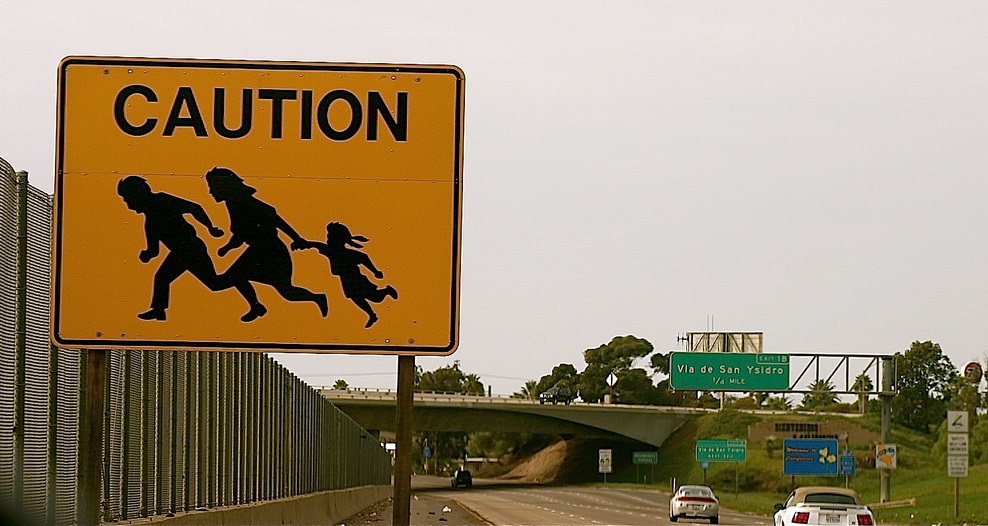Too often in immigration debates, Christians quote biblical passages about loving neighbors or the stranger as a proof text for supporting a policy of open borders — or at least a very generous immigration policy. This position starts from compassion toward the immigrant and proceeds to policy. Passages in scripture that counsel love and compassion towards outsiders and foreigners are pointed to. It seems straightforward that loving our neighbor in this situation means welcoming our neighbors south of the border. But that’s too simple.
The problems with this position, which are many, is that compassion and love for immigrants can take many forms for Christians which do not demand a policy of amnesty or open borders. Christian charity can take many forms other than letting in indefinite numbers of people into the country. Many people around this world live in tough circumstances and Christians should be doing all we can to help them, but it is by no means clear that the most just and charitable policy would necessarily require near limitless immigration, as most Democratic presidential candidates are now demanding.
Further, it flies in the face of the evidence that we have from the past two years. Todd Owen, Executive Assistant Commissioner for Field Operations at U.S. Customs and Border Protection, stated in a recent interview that the unprecedented surge in immigration on the southern border is due to a belief that the border will either be closed under Trump or that a Democratic president will grant amnesty, as with the Obama Administration’s DACA policy.
Immigration figures for this year are unprecedented and have gone largely unreported by the press. As of September, the number of apprehensions on the southern border were 926,000. To give perspective, apprehensions for the entire fiscal year 2018 were 521,000. By the end of this year the number will have doubled!
The system, as it currently stands, encourages immigration for reasons of fear or desire for amnesty. Securing borders through comprehensive reform would remove incentives that push the immigration system to the brink and exhaust resources that should be deployed elsewhere. Loving our neighbor means we should not encourage immigrants to break our laws by making an often treacherous journey across our border.
In fact, a Christian response to immigration would also take into consideration the effects of immigration on our neighbors within our own country. While it is true that immigration has had positive benefits for America throughout its history, there are also negative effects. Immigration on a mass scale, which we are experiencing right now, can have negative effects that disproportionately affect the less well off. Love for neighbors requires that we consider the needs and well-being of our communities, states, and countries before those outside of our borders. To advocate policies that are completely dismissive of the effects on other Americans in the name of compassion for others is failure of love, not its fulfillment.
The recent proposal by the Evangelical Immigration Table (EIT) is one idea for securing our borders and upholding the rule of law while keeping families together and not inflicting draconian punishments on immigrants. By advocating for a restitution-based policy, the EIT proposal possibly would end the perverse incentives encouraging illegal immigration by securing the border while providing a way for illegal immigrants to secure legal residency without merely granting amnesty.
[Editor’s note: Others are more skeptical of the latest plan from EIT, which traditionally touts permissive immigration policies.]
If we are guided solely by compassion for the immigrant, we are not doing all that charity would require of us. How can we say that we are doing all that love requires if we only consider the needs of the immigrant whom we cannot see and do not take into consideration the needs of fellow citizens whom we do see?





Comment by JR on December 13, 2019 at 11:01 am
“How can we say that we are doing all that love requires if we only consider the needs of the immigrant whom we cannot see and do not take into consideration the needs of fellow citizens whom we do see?”
That’s a fair point – but when that immigrant is on the border, we are now actually seeing that person as well.
I’m not in favor of open borders. There needs to be a certain amount of management of the influx of people. At the same time, there’s no need for cruelty – and as a Christian, we should actively be opposing those who choose to use cruelty as their method of immigration control.
I would be in favor of a limited amnesty/path to citizenship for those who have been longtime residents and productive members of society (perhaps the cutoff would be looking back 5 or even 10 years).
If one major cause of such immigration is economic, why aren’t we investing in these other countries to help their economy?
If another major cause of such immigration is safety, why aren’t we working to help secure these countries from violence?
It seems to me that all we are saying is that we are not our brother’s keeper.
Comment by James R Summers on December 15, 2019 at 4:59 pm
We do provide massive amounts of aid to the countries these illegal aliens come from.
Comment by JR on December 16, 2019 at 2:23 pm
*cough*cough*
I think a 36% drop in aid is pretty significant, don’t you?
https://fas.org/sgp/crs/row/R45089.pdf
Comment by Dan on December 13, 2019 at 11:11 am
One major point that always seems to be left out is the biblical mandate for sojourners to fully assimilate if they intend to stay. Much as Ruth told Naomi “your people shall be my people and your God my God,” immigrants need to assimilate into American culture and learn English. If you look at the Somali community in MN, it’s not called little Mogadishu for no reason. Similarly, in Dearborn MI it looks more like the Middle East than an American neighborhood. We also need to remember Paul’s admonition to the folks who just want wait around for the second coming – if you are able and you don’t work then you don’t eat. Immigration law says that you are not to be a burden on the public. This is routinely violated by illegal immigrants who are scamming the system.
Comment by JR on December 13, 2019 at 4:33 pm
I agree with you on the integration points. Perhaps you could reach out to a non-profit and help some relocated refugees move in next door. [Before you ask, I’ve done some work with one of those non-profits, helping furnish a house for newly arrived folks. It’s quite fulfilling work.]
I think the ‘burden’ aspect is overplayed. Not that it doesn’t happen, but that is not the norm.
https://www.migrationpolicy.org/news/why-hide-facts-about-refugee-costs-and-benefits
Comment by Rebecca on December 14, 2019 at 2:18 pm
You’ve brought up a good point. Many non-profits are making money off of the taxpayers and others by helping illegal immigrants and legal immigrants stay in this country. Some of the government facilities which used to be devoted to citizens are now being used to help immigrants instead. I’m thinking of the neighborhood libraries I’ve seen which have gone digital except for books to help immigrants, and this is in English speaking areas. Also the non-profits get first dibs on foreclosed housing which will be used for immigrants. There are all kinds of twist and turns. Forcing the “rich” or in this case richer to pay for the poor isn’t Biblical.
Comment by David on December 15, 2019 at 9:18 am
My local public library, established in 1858, has long devoted itself to the teaching of English to immigrants. In the meanwhile, its book collections include Chinese, Korean, Russian, Spanish, Indic Languages, Bengali, Gujarati, Hindi, Punjabi, Urdu, French, German, Japanese, Portuguese, Telugu, and Arabic. It also offers services to those English speakers that lack literacy. Other programs including how to write resumes.
Comment by Dan on December 16, 2019 at 10:04 am
Why don’t you have them move next door to you Mr. Snarky? As for your statisitcal reference, I call BS. The funders’ list include all the usual lefty foundations and George Soros’ Open Society foundation. I wouldn’t trust these statistics.
Let’s look at history. The Marshall Plan didn’t use mass migration of people from Europe after WWII. We rebuilt Europe to make it better for the people already there. The simple fact is that the U.S. has been more generous and giving than any other nation when it comes to helping out. What good does it do to beggar our own nation when we cannot even afford to provide for all our current citizens. All your open borders buddies want to do is remake the world into one big pile of humanity that struggles to survive while the bureaucratic, governing elites get and keep their opulent lifestyles. Current example #1 – Venezuela; the regular people are starving while Maduro and his cronies get fat, literally – look at some pictures of him over time.
Comment by Randy Thompson on December 13, 2019 at 7:35 pm
Secure borders? Yes.
But, as long as their are desperate people, and there are desperate people, borders will be irrelevant to them. I don’t know what the solution is, but whatever else, we need to take seriously the desperation of millions of people–people who are legitimately desperate. If we want secure borders, then we need to start thinking about why so many countries such as Guatemala and El Salvador produce desperate people and what can and should do about it.
Comment by Byrom on December 13, 2019 at 9:00 pm
This is a touchy subject for me. I see that no one quotes the New Testament Scripture passages about obeying the civil laws of a country or the civil authorities. A quote attributed to
Thomas Sowell is: “Immigration laws are the only laws that are discussed in terms of how to help those who break them.”
Now, what to do about those who are here illegally is a really thorny issue, especially when children were brought here through no fault of there own. Clearly, the United States cannot support all of those who come here for economic reasons rather than legitimate asylum reasons. Our social welfare system cannot even help all of our own citizens who are in need. I am compassionate to a point. If I break the law, I expect consequences. Why should that be any different for those who break our laws by entering the U.S. illegally?
A small disclaimer: I volunteer at and support a food-pantry ministry supported by my church. Many of our clients may be here illegally based upon the type of IDs which they present. We do not discriminate against them in any way. They are already here, and I do not want to see them lack food when they need it.
Comment by David on December 15, 2019 at 5:30 pm
The bad part of all these “compassionate” Christians is they are part of the problem because the illegals are abusing that compassion. They come because there are no consequences and people who help them break the law. The best deterrent to the influx is close the border but cutting off the incentives. No aid to non-citizens, finding and fining US companies that hire them, no driver’s licenses or other US documentation, and deportation for the whole family regardless of time in country. These laws are on the books now, just enforce them.
Comment by Matthew Roth on December 13, 2019 at 11:42 pm
I don’t think we can continue to accept the massive amounts of immigration that we currently do. Entry into our country just becomes a rigged lottery ticket, and leaves the truly poor of the world worse off.
As Christians, we should accept the task of raising others up around the world (mission work), such that all communities can enjoy the peace and freedom that we currently enjoy. Who would hide a lamp underneath a basket? (Matthew 5:14-16). No, we should let our “light” reach the four corners of the earth!
Because I see immigration in this light (pardon the pun), continuing this non-enforcement immigration policy is akin to a short term solution, and this is counterproductive to our long term goals to spread American values and ideals (or Christian values, if you’d like to argue that). Concrete example: the rise of mafias/gangs in Mexico that traffic drugs and humans. Violence rules the day for too many communities, and we’re enabling it, allowing evil entities to become well funded.
Comment by td on December 15, 2019 at 7:40 pm
I think people get confused on the terms and the differences between those wanting to immigrate and those seeking refuge or asylum. It seems a compassionate border policy should focus on those who seek political refugee or asylum status- and these are areas where it seems that some reasonable compromise can be reached easily.
However, concerning broad policy for immigration there simply is no middle ground for those who think that anyone who wants to live in the US should be allowed to. And for some reason the open border advocates have decided that any other policy is unamerican- which is blatantly incorrect since our country’s history has had periods of both closed and open borders.
Comment by JR on December 16, 2019 at 2:35 pm
I agree with you, TD.
Control of our own borders is important.
Giving refuge to true refugees is important.
A certain amount of legal immigration is also important for most advanced societies, and I’m in favor of changing those rules as well. I don’t think we have too much legal immigration at all, but the specifics are skewed.
With all of that being considered, avoiding cruelty to border violators is also important. There’s no need for that.
Comment by David Martin on April 12, 2020 at 4:23 pm
12% of daca, are now fellons